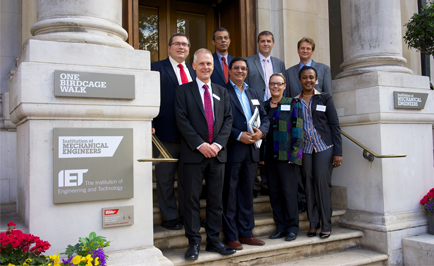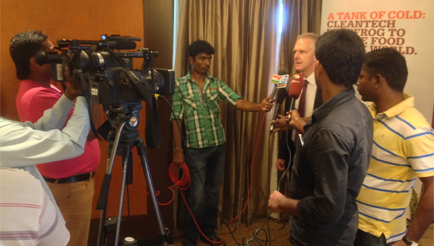Dr Tim Fox, Head of Energy and Environment at the Institution of Mechanical Engineers, is the lead author of the report, entitled:
A Tank of Cold: Cleantech Leapfrog to a more food secure world.
Dr Fox travelled to India to engage in a range of meetings and events sharing the report’s findings and recommendations.
He says the key to reducing food wastage – and hunger – in the developing world is investment in cost-effective and sustainable cold chain infrastructure. According to the report, about 25% of food wastage in the developing world could be eliminated with better refrigeration equipment. Dr Fox commented:
“Globally we currently produce enough food, but the tragedy is that too much of it is lost unnecessarily through spoilage in developing countries, where it is most needed, due to inadequate infrastructure and, in particular, a lack of cold and frozen supply chains.”
“Governments; NGOs involved in development initiatives; and retailers establishing supply chains, need to prioritise investment into affordable, reliable and sustainable cold chain infrastructure. This includes combining renewable energy with innovative technologies for producing both power and cooling, such as cryogenic energy storage using liquid air or nitrogen.”
Ahead of Dr Fox’s departure to India, the Institution hosted the two-day ‘Clean and Cool’ summit, at One Birdcage Walk. International experts and stakeholders gathered with Tim Fox to discuss the cold chain report’s findings, and held a series of workshops to explore the future of engineering in cold chain technologies. Delegates came from a wide range of countries including the USA, The Netherlands, Belgium, Italy, Tanzania, India, Malaysia and Australia, as well as the UK. Among the speakers were Professor Richard Williams OBE, Pro-Vice Chancellor of the University of Birmingham; Pawanexh Kohli, India’s Chief Advisor to the National Centre for Cold Chain Development; Lisa Kitinoja, Founder of the Postharvest Education Foundation and an international expert on food losses in developing countries; and Jacqueline Mkindi, Executive Director, Tanzania Horticultural Association.

According to the cold chain report, up to 50% of fruit and vegetables are lost in Sub-Saharan Africa and India; while Tanzania sees 25% of all milk produced in the wet season end up as wastage and 97% of its meat sold warm, having never been chilled. In India, it is estimated that 40% of fresh food produce is lost annually.
Dr Fox’s eight busy days in India were spent sharing the report’s analysis and recommendations; participating in a discourse on cold chain technology across the country; and exploring the challenges faced by the food industry. In New Delhi, Chennai, Mumbai and Pune, he met senior Indian government representatives and heads of food production and distribution companies, as well as members of academia and the press, accompanied by Prabal Sarma, the Institution’s Consulting Director, India.
India is a key base for growth and research and the Institution felt it was crucial to pinpoint the issues of food wastage and cold chain technology – and the ways in which engineering can support sustainable solutions – in a relevant environment.
Prabal Sarma commented on the effectiveness of launching the report in India, and the positive response that the Institution’s thought-leading research has received:
“The most rewarding aspect, during Tim Fox’s visit, has been the wholehearted acceptance from opinion leaders – spanning government, diverse industries and academia – of the Institution’s compelling solutions, which provide practical pathways for addressing the global food crisis. The Indian media has widely covered the findings and has highlighted the coherence between the Institution’s initial food report, and the present research, which provides a vital cog in the wheel in alleviating the loss of perishable foodstuffs. As in the UK in recent years, the Institution is truly beginning to set the agenda here, in India, for this area of engineering.”

India’s investment in cold chains is forecast to be US$15 billion over the next five years. However, since 350 million people in India are located off-grid in rural locations, and where electricity grid infrastructure is in place it is often unreliable and extremely inefficient, the report specifies using local renewable energy sources, which are in abundance across the country. Building on existing ambitions for electricity access and energy security, the Government of India has a role to play in encouraging development of community renewable energy projects with energy storage to provide the cold and freezing needed for effective rollout of sustainable cold chains. This will help ensure cold chain investments are sustainable and cost effective, both in the short and long-term.
Dr Fox says,
“At today’s prices, using the cryogenic engine technology highlighted in our new report to provide the cooling of large refrigerated lorry or rail containers will cost between a fifth and a third of using diesel for the same job. It has the added benefit of zero-emission of pollutants at the point of use. When combined with the increased income to farmers from getting more produce to market, this makes economic as well as environmental sense. Getting started by harnessing the waste cold available at LNG re-gasification plants to produce the cryogen needed leads to further financial gains since up to two thirds of the energy used in the process can be saved. India is well placed to take this opportunity as it has both the LNG infrastructure and the engineering talent to make it happen. The country also has a substantial amount of surplus nitrogen production capacity that could be harnessed to get started on using this technology.”
He concluded:
“I am happy to report that during my visit the Institution’s ideas, thinking and suggested solutions were well received. All the signs are that the appropriate government departments will move forward with a detailed assessment and consideration of the potential for getting started.”
The Institution makes three key recommendations in its report:
1. Governments of newly emerging and rapidly industrialising economies must prioritise support investment in cold chain infrastructure to improve food security, underpin development and help alleviate poverty.
2. Donor country governments and development NGOs must support and incentivise aid recipients to develop sustainable cold chains using renewable energy and waste cold.
3. The UK engineering community should come together to define in detail the potential opportunities a joined-up cold economy presents for the developed and developing world.
Read the full report:
A Tank of Cold: Cleantech Leapfrog to a more food secure world